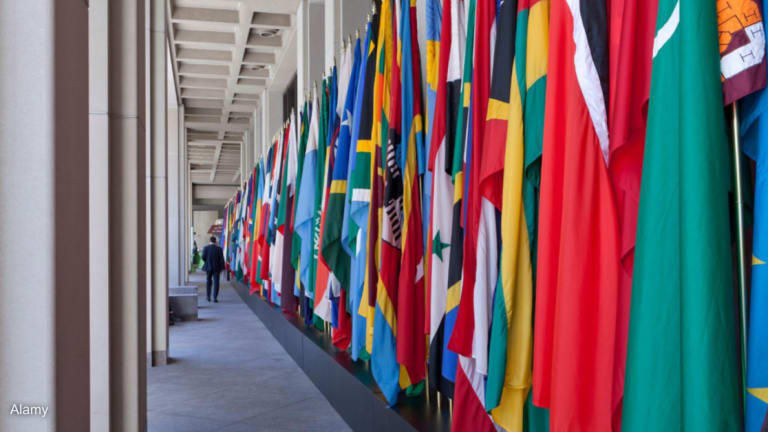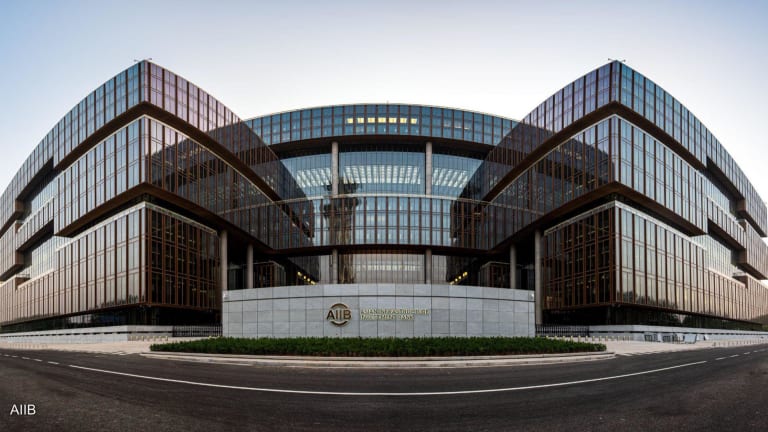Interactive: AfDB contract award data, what you need to know
The African Development Bank's contracts show overwhelming support for large-scale infrastructure projects on the continent. Devex analyzes the data for further insights.
Details of contracts awarded by the African Development Bank overwhelmingly show the importance of large-scale infrastructure projects in its strategy to invest in the development of Africa. To support these projects, AfDB is showing a preference for partners headquartered outside of Africa — especially China-based companies. Despite the big money going to build better roads and large-scale engineering projects, its contracts still show a large portfolio of projects supporting smaller social impact initiatives and community projects. Devex has analyzed the contracts awarded for 2018, combining it with contract details dating back to 2000. Analyze the data in this tableau interactive — we’ve pulled out the key insights for global development professionals. Award insights Award categories provide insight into AfDB’s internal classification of contracts; including goods, operating costs, services, works, and miscellaneous expenses. With infrastructure the leading focus for AfDB by contract value, this category is dominated by awards classed as works — more than three-quarters of contracts in 2018 or $1.8 billion on total contracts. Goods account for 14.3% of total contract values or $351 million in investment, and include capacity building projects, education initiatives, agricultural production support, social assistance, and water and sanitation services. In 2018, Egypt was the leading country of origin and recipient of awards classed as goods thanks to Abu-Rawash WWTP phase II project awarded to Orasqualia Abu Rawash. Services account for 10.4% of the total contract value in 2018 — or $256 million worth of contracts. And this category shifts the partnership focus to Europe. Award supporting services include geothermal power projects, urban transport initiatives, modernization initiatives, and water supply. France was the leading country of origin for suppliers in this category with awards valued at $19 million in 2018. Combined bids from companies including Setec TPI, Groupe Défis et Stratégies, and EGIS International were among the leading French-based providers of service to AfDB. Sector insights Analyzing contracts by award provides limited insight into the focus and impact of contracts. While analysis by sector provides richer details in a range of categories, including environment, power, social, transport, and water supply and sanitation. Again, infrastructure dominates financially. Transport, and water and sanitation projects account for more than half of all contract value awarded in 2018 with the leading service providers predominantly headquartered in China. Looking at other sectors we can see the smaller scale impact and where local suppliers are preferred. In contracts awarded supporting the agriculture sector, Uganda is the largest service provided based on total contract value. Twenty-five contracts were awarded to Ugandan-based companies in 2018 worth a total of $43 million. The contracts awarded included Markets and Trade Improvement Project phase II, Lakes Edward and Albert Fisheries and Water Resources Management Project, and Drought Resilience and Sustainable Livelihoods Program ROKO Construction Limited is the leading Ugandan provider of agricultural services receiving contracts in excess of $5 million. While China was ranked second and Norway fourth for agricultural service providers, the remainder of the top 10 supplier nations are African. Supporting the social sector, contracts awarded accounted for 5.7% of the total value of in 2018 — $138 million dollars worth of contracts in areas easily dominated by African-based providers. The largest contracts in this sector include $15 million East Africa Centers of Excellence Uganda awarded to ROKO Construction Limited. This was followed by a $6 million contract supporting improved quality education and skills development in Sudan awarded to Sudan-based Advanced Engineering, and a $5 million contract awarded to Zambia-based Conduril-Engenharia to support skills development and entrepreneurship in Zambia. Overall, contracts were $471,000 on average in the services sector. The environmental sector remains a low priority for AfDB. Since the start of the decade, environmental projects have not exceeded more than 1.4% of total contract value and in 2018, received just 0.8% of all contracts. The environmental focus financially for AfDB instead appears to be in the power sector, receiving 11.8% — or $290 million — of the total value of contracts in 2018. The big money is in power, but there were a larger number of projects supporting the environmental sector — 117 compared to 108. But they are smaller and valued less with the average value of contracts supporting the environment in 2018, worth $159,000. Only 17 supplier countries are listed as supporting environmental projects in 2018: Italy, Canada, Belgium, and France, the remainder were African-based suppliers. The majority of projects were multinational initiatives with only six countries — Niger, Zambia, Madagascar, Gabon, Mozambique, and Angola — seeing direct support from the awarded contracts. Strengthening climate resilience in the Kafue sub-basin was the largest contract awarded, worth $1.7 million, and Italian based Siap+Micros is the leading provider of services with two contracts totaling $2.2 million supporting the Strategic Program for Climate Resilience in Niger. China: Country of origin insights The presence of China in Africa is an ongoing discussion in development. AfDB contract numbers show them as a large player — at least financially. In 2018, contracts awarded to Chinese-based companies accounted for 39.8% of the total value of contracts awarded by AfDB in 2018 — a total of $974 million. China is the leading partner for AfDB in eight of the past 10 years, cementing a strong partnership. But despite this financial dominance, they were only awarded 62 contracts — less than 3% of all contracts awarded in 2018. The average contract awarded to Chinese-based suppliers is $16 million, showing a preference that bigger is better. In 2018, China focused on four key sectors — transport, water supply, and sanitation, power, and agriculture. Approximately 97% of the contract value was focused on awards classed as works. China State Construction Engineering, Sinohydro Corporation Limited, and China Henan International Cooperation Group were the leading Chinese companies supporting AfDB. But Chinese-based contractors are willing to support smaller contracts — with the lowest awarded to a Chinese-based supplier in 2018 worth only $40,000. Despite the lower number of contracts awarded, more may be going to Chinese-headquartered companies than the raw AfDB data suggests. More and more Chinese companies are establishing an African base. In 2018, Sinohydro Corporation Limited and China Civil Engineering Construction were classified as African-based for some contracts. Project country insights While it is important to analyze suppliers and sectors of support, it is also important to analyze where the support is being directed. These projects all aim to support the development of people living in Africa. The priority for AfDB in 2018 was multinational projects for wider scale impact — accounting for 15.1% on total contract values in 2018 or $371 million. Following these multinational initiatives, Zambia was the largest recipient of support through awarded contracts, with 169 contracts awarded supporting $287 million. This was followed by Tanzania with 66 contracts worth $214 million, Kenya with 85 contracts worth $211 million, and Côte d'Ivoire with 101 contracts worth $202 million. In each of these nations, projects supporting the transport sector are leading the financial investment from AfDB, including the improvement for the Chinsali-Nakonde Road in Zambia — an important network that will enable better trade between Zambia and Tanzania and enhance tourism. The recipients of the lowest direct financial investments were Algeria, with three contracts valued at $135,000, Seychelles with five contracts valued at $183,000, and Mauritania with no contracts, worth $468,000. None of these countries received support for transport investment. In Algeria, the focus was on the modernization of systems to support financial development. In Seychelles, the focus was on broad social impact initiatives. In Mauritania, the investment was wider covering agricultural, finance, social, and water and sanitation work but at the lower end of the financial scale. There are also countries who received no direct AfDB investment in 2018 including Botswana and Equatorial Guinea. The data itself can provide a jumping off point to more research or engagement with AfDB on its project priorities. And there are more insights that can be discovered through the data to support the diverse needs of AfDB partners and development organizations. Interact with the tableau visualization about AfDB contracts awarded for more insights. Update, June 7, 2019: This article’s headline has been updated to AfDB contract award data.
Details of contracts awarded by the African Development Bank overwhelmingly show the importance of large-scale infrastructure projects in its strategy to invest in the development of Africa.
To support these projects, AfDB is showing a preference for partners headquartered outside of Africa — especially China-based companies. Despite the big money going to build better roads and large-scale engineering projects, its contracts still show a large portfolio of projects supporting smaller social impact initiatives and community projects.
Devex has analyzed the contracts awarded for 2018, combining it with contract details dating back to 2000. Analyze the data in this tableau interactive — we’ve pulled out the key insights for global development professionals.
This story is forDevex Promembers
Unlock this story now with a 15-day free trial of Devex Pro.
With a Devex Pro subscription you'll get access to deeper analysis and exclusive insights from our reporters and analysts.
Start my free trialRequest a group subscription Printing articles to share with others is a breach of our terms and conditions and copyright policy. Please use the sharing options on the left side of the article. Devex Pro members may share up to 10 articles per month using the Pro share tool ( ).
Lisa Cornish is a former Devex Senior Reporter based in Canberra, where she focuses on the Australian aid community. Lisa has worked with News Corp Australia as a data journalist and has been published throughout Australia in the Daily Telegraph in Melbourne, Herald Sun in Melbourne, Courier-Mail in Brisbane, and online through news.com.au. Lisa additionally consults with Australian government providing data analytics, reporting and visualization services.




